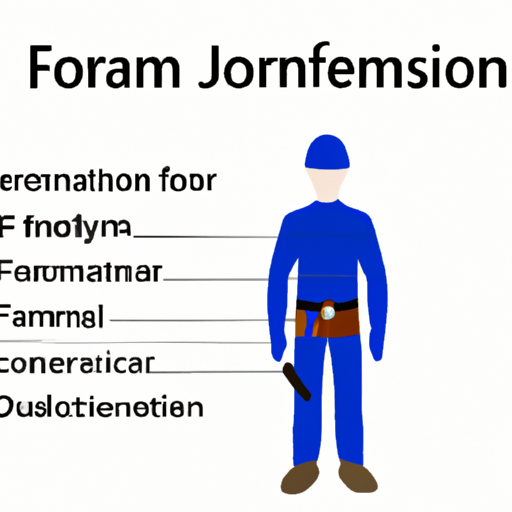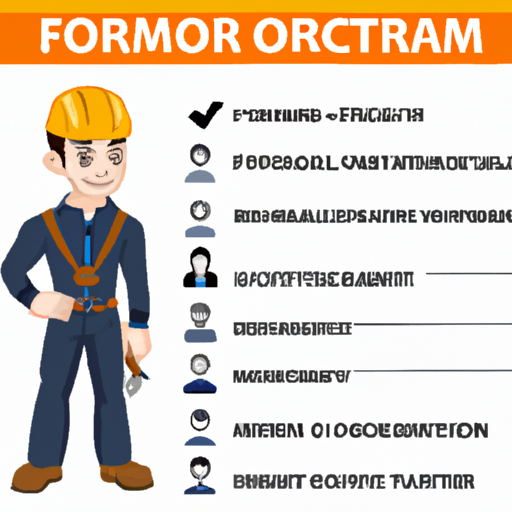The role of a foreman in the workplace is crucial, as they are responsible for overseeing the daily operations and ensuring that projects are completed efficiently and to high standards. A foreman acts as a link between management and workers, bridging the gap by communicating instructions, monitoring progress, and providing guidance. In this article, we will explore the job description of a foreman in detail, shedding light on the diverse set of skills and responsibilities required to excel in this role. Whether you aspire to become a foreman or are seeking a better understanding of their role within an organization, this article will equip you with comprehensive insights into the key aspects of this profession.
Table of Contents
- Responsibilities of a Foreman
- Qualifications and Skills for the Foreman Position
- Importance of Leadership Skills in a Foreman Role
- Effective Communication Strategies for Foremen
- Ensuring Safety and Compliance as a Foreman
- Managing Workforce and Assigning Tasks as a Foreman
- The Role of Problem-Solving in the Foreman Position
- Time Management Tips for Foremen
- Cultivating a Positive Work Environment as a Foreman
- Insights and Conclusions

Responsibilities of a Foreman
A foreman plays a crucial role in overseeing and coordinating construction projects from start to finish. They are responsible for ensuring that all activities on the worksite are carried out efficiently, safely, and in accordance with the project plans and specifications. Here are some key :
- Supervising the Workforce: The foreman is responsible for managing and directing the construction crew, including assigning tasks, monitoring progress, and providing guidance and support. They ensure that the workforce operates effectively and meets project deadlines.
- Ensuring Site Safety: Safety is a top priority on any construction site, and the foreman plays a crucial role in maintaining a safe working environment. They enforce safety regulations, conduct regular inspections, and address any hazards or issues promptly to ensure the well-being of the crew.
- Managing Resources: From tools and equipment to materials and supplies, the foreman is responsible for managing and organizing all necessary resources for the project. They coordinate deliveries, track inventory, and ensure that the construction site has everything required for continuous operation.
Additionally, the foreman is responsible for maintaining effective communication with project managers, clients, and subcontractors. They provide regular status updates, address any concerns or issues, and facilitate collaboration among various stakeholders. Overall, a skilled and responsible foreman is essential for the successful completion of construction projects.

Qualifications and Skills for the Foreman Position
To be considered for the role of Foreman, candidates must possess a set of qualifications and skills that enable them to effectively lead and manage a team. These attributes are essential in ensuring smooth operations, maintaining productivity, and promoting a safe working environment.
1. Experience: A minimum of 5 years of relevant experience in a supervisory or leadership position within the industry is required. This allows the Foreman to have a comprehensive understanding of the job requirements, project management, and the ability to make informed decisions to overcome any challenges that may arise.
2. Technical Knowledge: Proficiency in the use of industry-specific tools and equipment is crucial. A Foreman should have a deep understanding of the technical aspects of the job, ensuring effective coordination and troubleshooting when necessary. Additionally, a solid grasp of relevant construction codes, regulations, and safety protocols is essential to maintain compliance and minimize risk.

Importance of Leadership Skills in a Foreman Role
Leadership skills play a pivotal role in the success of individuals occupying the foreman role. A foreman is responsible for overseeing a team of workers and ensuring that all tasks are performed efficiently and effectively. By possessing strong leadership skills, a foreman can establish clear directions, provide guidance, and motivate their team to achieve collective goals.
Firstly, effective leadership skills enable a foreman to effectively communicate expectations and objectives to their team. By clearly conveying performance standards and job requirements, a foreman can ensure that each team member understands their responsibilities and can work in harmony towards a common goal. Additionally, strong leadership skills empower a foreman to make decisions promptly, allocate resources efficiently, and solve problems effectively. These qualities contribute to a smoother workflow and enhance productivity within the team.
Effective Communication Strategies for Foremen
Foremen play a crucial role in the success of any construction project, as they are responsible for overseeing the work of their crew members. To effectively carry out their duties, foremen must possess strong communication skills. Here are some strategies that foremen can employ to enhance their communication abilities:
1. Clear and Concise Instructions: When assigning tasks to crew members, foremen should provide clear and concise instructions to ensure that everyone understands their responsibilities. Clearly outlining the objectives and expectations of each task helps to minimize misunderstandings and ensures that the work is completed efficiently.
2. Active Listening: Effective communication is a two-way street, and foremen must actively listen to their crew members. This involves fully focusing on what others are saying without interrupting or making assumptions. By actively listening, foremen can better understand any concerns, suggestions, or issues raised by their team, leading to improved collaboration and problem-solving.
3. Empathy and Respect: Building a positive working relationship with crew members is essential for effective communication. Foremen should demonstrate empathy and respect by appreciating the efforts and ideas of their team members. Encouraging open dialogue and considering different perspectives fosters a supportive work environment, where communication flows more freely.
In addition to these strategies, foremen can organize regular meetings to address any communication barriers or challenges that may arise. By implementing these effective communication strategies, foremen can greatly enhance their ability to lead their team and successfully execute construction projects.
Ensuring Safety and Compliance as a Foreman
Safety: As a foreman, ensuring the safety of all workers and ensuring compliance with safety regulations is of paramount importance. You will be responsible for implementing and maintaining a safe working environment, conducting regular safety inspections, and identifying potential hazards to prevent accidents and injuries. It is crucial to promote the use of personal protective equipment (PPE) and enforce safety protocols at all times. Additionally, you will be responsible for conducting safety training sessions, empowering the team with the knowledge and skills necessary to work safely and efficiently.
Compliance: Compliance with local, state, and federal regulations is fundamental in a foreman’s role. You will need to stay up-to-date with industry standards and ensure that all work is in full compliance with applicable codes and regulations. This includes obtaining necessary permits and licenses, coordinating with authorities during inspections, and maintaining accurate documentation. Furthermore, you will need to monitor the quality of work and ensure that it meets the required specifications and standards set by the project’s scope. By diligently adhering to safety and compliance protocols as a foreman, you will contribute to the overall success and reputation of the company and provide a secure working environment for all team members.
Managing Workforce and Assigning Tasks as a Foreman
As a Foreman, your primary responsibility is managing the workforce and efficiently assigning tasks to ensure the successful completion of construction projects. With your expertise, you will play a crucial role in coordinating and supervising the day-to-day activities on-site. Effective communication and strong leadership skills are essential to maintain a productive and harmonious work environment.
Here are some key duties and responsibilities you can expect as a Foreman:
- Organizing and delegating tasks to the appropriate crew members based on their skills and experience.
- Monitoring and supervising the progress of each task, ensuring adherence to project timelines and quality standards.
- Conducting regular inspections to identify any safety hazards and implementing necessary corrective actions to maintain a safe work environment.
- Collaborating with project managers and other stakeholders to communicate updates, resolve issues, and ensure project objectives are met.
- Motivating and guiding the team to optimize productivity and achieve targets, providing necessary support and training when required.
- Maintaining accurate records of daily activities, including materials used, time spent on tasks, and quantities of work completed.
If you are a detail-oriented individual with excellent problem-solving skills and the ability to manage a diverse workforce, this Foreman position may be the perfect fit for you. Join our team and contribute to the successful completion of our construction projects.
The Role of Problem-Solving in the Foreman Position
In the dynamic environment of a foreman, problem-solving skills are instrumental in ensuring smooth operations and achieving project goals efficiently. As a foreman, you will encounter various challenges that demand immediate resolution, making effective problem-solving a crucial aspect of your role. Here’s why problem-solving is paramount in the foreman position:
1. Identifying and Analyzing Issues: As a foreman, you will be responsible for overseeing the day-to-day activities on site. Problems can arise unexpectedly, ranging from equipment malfunctions to safety concerns. Your problem-solving abilities will be essential in quickly identifying these issues and gathering relevant information to analyze their root causes. By determining the underlying problems, you can devise effective solutions and prevent further complications.
2. Implementing Effective Solutions: Once you have assessed the problem, it is crucial to develop and implement effective solutions promptly. Problem-solving skills enable you to think critically, evaluate alternatives, and select the best course of action. As a foreman, you might encounter budget constraints, time limitations, or resource scarcity. Skillfully applying creative problem-solving techniques allows you to navigate these challenges and ensure the smooth progress of the project.
3. Collaboration and Leadership: Problem-solving in the foreman position often involves collaborating with various stakeholders, including project managers, workers, and subcontractors. Your ability to effectively communicate and lead during problem-solving situations ensures that everyone understands the issue at hand and is working towards a common solution. By fostering a collaborative environment, you can harness the collective intelligence and skills of your team, enhancing problem-solving outcomes.
In conclusion, problem-solving is a vital skill for a foreman. It enables you to identify and analyze issues efficiently, implement effective solutions, and foster collaboration among team members. By sharpening your problem-solving abilities, you will enhance your effectiveness as a foreman and contribute to the success of your projects.
Time Management Tips for Foremen
As a foreman, effective time management is crucial for maintaining the smooth operation of your team and ensuring timely project completion. Here are some essential tips to help you optimize your time and maximize productivity:
- Plan and prioritize: Start each day by creating a detailed schedule of tasks, assigning priorities to each. This will help you stay focused and ensure that critical activities are not overlooked.
- Delegate effectively: Recognize that you cannot handle every task yourself and delegate responsibilities to your team members. Identify their strengths and assign tasks accordingly, ensuring efficient use of resources and promoting team development.
- Set realistic deadlines: When setting deadlines, consider the complexity of the task, available resources, and potential obstacles. Communicate these deadlines to your team to maintain accountability and avoid confusion.
- Eliminate distractions: Minimize interruptions by creating a work environment free from unnecessary distractions. Use time blocking techniques to allocate specific time slots for focused work and encourage your team to do the same.
- Use technology to your advantage: Explore time management tools and software that can help streamline your work processes. Project management applications can assist in organizing tasks, tracking progress, and ensuring effective communication with your team.
- Regularly review and adjust: Continuously evaluate your time management strategies and make adjustments when necessary. Identify areas where you can improve and seek feedback from your team to identify bottlenecks or better approaches.
By implementing these time management tips, you will enhance your effectiveness as a foreman and contribute to the overall success of your team and projects. Remember, efficient time management is a skill that requires practice and commitment, so remain disciplined in your approach and encourage a culture of productivity within your team.
Cultivating a Positive Work Environment as a Foreman
Creating a positive work environment is a crucial aspect of being an effective foreman. By fostering a culture of positivity and support, you not only enhance team morale but also improve productivity and overall job satisfaction. Here are some key strategies to cultivate a positive work environment:
- Lead by example: As a foreman, your behavior and attitude set the tone for the entire crew. Displaying professionalism, respect, and a positive demeanor will inspire your team to do the same.
- Encourage open communication: Establishing clear channels of communication allows for the free flow of ideas, concerns, and feedback. Encourage your team members to voice their thoughts and actively listen to their input.
- Recognize and appreciate accomplishments: Celebrating achievements, big or small, is essential for fostering motivation and job satisfaction. Acknowledge the hard work and accomplishments of individuals and the team as a whole.
- Provide opportunities for growth: Employees who feel valued and have room for growth are more likely to be engaged and motivated. Offer training programs, mentorship, or career development opportunities to allow your team members to enhance their skills and advance in their careers.
A positive work environment not only benefits the individuals within the team but also contributes to the success of the project. Implementing these strategies will help create a harmonious atmosphere where teamwork, respect, and productivity thrive, making you an exceptional foreman who not only gets the job done but also ensures the well-being of your crew.
Insights and Conclusions
In conclusion, the role of a foreman plays a pivotal role in ensuring the smooth operations and productivity of a construction site. Through their leadership, technical expertise, and efficient management skills, foremen contribute significantly to the successful completion of projects on time and within budget. From overseeing workers and coordinating tasks to enforcing safety regulations and resolving conflicts, foremen bear the responsibility of maintaining high standards of workmanship, productivity, and safety. Their ability to adapt to dynamic work environments, communicate effectively, and make sound decisions makes them indispensable assets to any construction project. With their unwavering commitment to excellence, foremen uphold the integrity of the construction industry, leaving a lasting impact on both the teams they lead and the structures they help erect.
